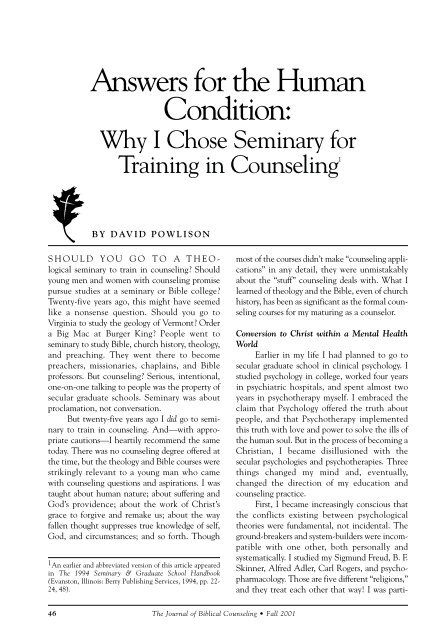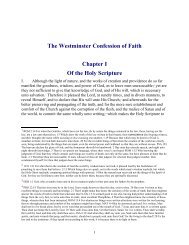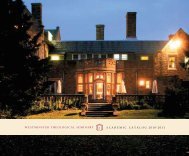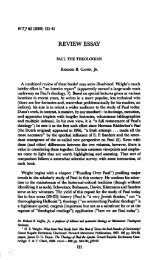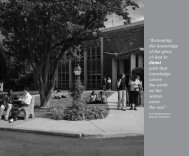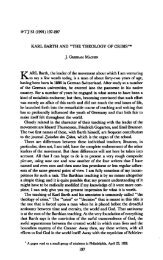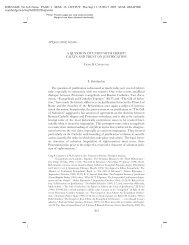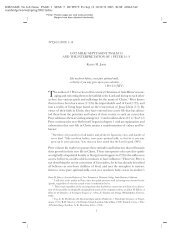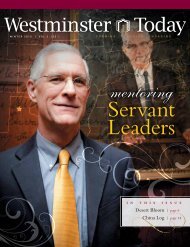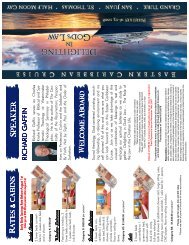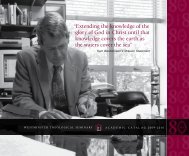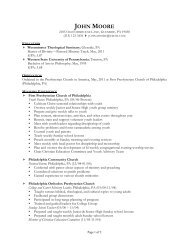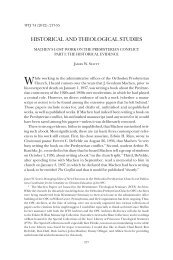Answers for the Human Condition - Westminster Theological Seminary
Answers for the Human Condition - Westminster Theological Seminary
Answers for the Human Condition - Westminster Theological Seminary
You also want an ePaper? Increase the reach of your titles
YUMPU automatically turns print PDFs into web optimized ePapers that Google loves.
<strong>Answers</strong> <strong>for</strong> <strong>the</strong> <strong>Human</strong><br />
<strong>Condition</strong>:<br />
Why I Chose <strong>Seminary</strong> <strong>for</strong><br />
Training in Counseling 1<br />
BY DAVID POWLISON<br />
SHOULD YOU GO TO A THEOlogical<br />
seminary to train in counseling? Should<br />
young men and women with counseling promise<br />
pursue studies at a seminary or Bible college?<br />
Twenty-five years ago, this might have seemed<br />
like a nonsense question. Should you go to<br />
Virginia to study <strong>the</strong> geology of Vermont? Order<br />
a Big Mac at Burger King? People went to<br />
seminary to study Bible, church history, <strong>the</strong>ology,<br />
and preaching. They went <strong>the</strong>re to become<br />
preachers, missionaries, chaplains, and Bible<br />
professors. But counseling? Serious, intentional,<br />
one-on-one talking to people was <strong>the</strong> property of<br />
secular graduate schools. <strong>Seminary</strong> was about<br />
proclamation, not conversation.<br />
But twenty-five years ago I did go to seminary<br />
to train in counseling. And—with appropriate<br />
cautions—I heartily recommend <strong>the</strong> same<br />
today. There was no counseling degree offered at<br />
<strong>the</strong> time, but <strong>the</strong> <strong>the</strong>ology and Bible courses were<br />
strikingly relevant to a young man who came<br />
with counseling questions and aspirations. I was<br />
taught about human nature; about suffering and<br />
God’s providence; about <strong>the</strong> work of Christ’s<br />
grace to <strong>for</strong>give and remake us; about <strong>the</strong> way<br />
fallen thought suppresses true knowledge of self,<br />
God, and circumstances; and so <strong>for</strong>th. Though<br />
1 An earlier and abbreviated version of this article appeared<br />
in The 1994 <strong>Seminary</strong> & Graduate School Handbook<br />
(Evanston, Illinois: Berry Publishing Services, 1994, pp. 22-<br />
24, 48).<br />
46<br />
The Journal of Biblical Counseling • Fall 2001<br />
most of <strong>the</strong> courses didn’t make “counseling applications”<br />
in any detail, <strong>the</strong>y were unmistakably<br />
about <strong>the</strong> “stuff” counseling deals with. What I<br />
learned of <strong>the</strong>ology and <strong>the</strong> Bible, even of church<br />
history, has been as significant as <strong>the</strong> <strong>for</strong>mal counseling<br />
courses <strong>for</strong> my maturing as a counselor.<br />
Conversion to Christ within a Mental Health<br />
World<br />
Earlier in my life I had planned to go to<br />
secular graduate school in clinical psychology. I<br />
studied psychology in college, worked four years<br />
in psychiatric hospitals, and spent almost two<br />
years in psycho<strong>the</strong>rapy myself. I embraced <strong>the</strong><br />
claim that Psychology offered <strong>the</strong> truth about<br />
people, and that Psycho<strong>the</strong>rapy implemented<br />
this truth with love and power to solve <strong>the</strong> ills of<br />
<strong>the</strong> human soul. But in <strong>the</strong> process of becoming a<br />
Christian, I became disillusioned with <strong>the</strong><br />
secular psychologies and psycho<strong>the</strong>rapies. Three<br />
things changed my mind and, eventually,<br />
changed <strong>the</strong> direction of my education and<br />
counseling practice.<br />
First, I became increasingly conscious that<br />
<strong>the</strong> conflicts existing between psychological<br />
<strong>the</strong>ories were fundamental, not incidental. The<br />
ground-breakers and system-builders were incompatible<br />
with one o<strong>the</strong>r, both personally and<br />
systematically. I studied my Sigmund Freud, B. F.<br />
Skinner, Alfred Adler, Carl Rogers, and psychopharmacology.<br />
Those are five different “religions,”<br />
and <strong>the</strong>y treat each o<strong>the</strong>r that way! I was parti-
cularly intrigued by object relations psychology,<br />
existentialist psychology, Carl Jung, Anna Freud,<br />
Erik Erikson, Irving Yalom, Fritz Perls, and<br />
Abraham Maslow. From such masters, I initially<br />
created my own loose syncretism. Over time,<br />
however, that syncretism proved unstable. The<br />
contradictory character of <strong>the</strong> component parts<br />
asserted itself. Who was right? Every <strong>the</strong>ory<br />
seemed “sort of right,” until <strong>the</strong> next <strong>the</strong>ory put<br />
a different spin on <strong>the</strong> same observations or<br />
brought different observations to <strong>the</strong> <strong>for</strong>e to show<br />
up <strong>the</strong> previous <strong>the</strong>ory as “quite wrong.” The<br />
second generation <strong>the</strong>orists, text-book writers,<br />
<strong>the</strong>rapists, and students-in-training like me, often<br />
tended to be more tolerant, eclectic, and<br />
syncretistic. We tried to integrate incompatible<br />
views of human nature into a fuller, truer<br />
syn<strong>the</strong>sis. But principled eclecticism, no less than<br />
passionate commitment to a particular <strong>the</strong>ory,<br />
still installed each person as his or her own<br />
ultimate authority, <strong>the</strong> founder of an idiosyncratic<br />
Grand Unified Theory. “Every man did<br />
what was right in his own eyes” is <strong>the</strong> way I’d put<br />
it now. I increasingly questioned whe<strong>the</strong>r <strong>the</strong><br />
modern psychologies really offered much beyond<br />
common-sense observations of people and an<br />
attentive kindness. Meanwhile, Christianity was<br />
increasingly making better-sense observations of<br />
people and speaking of a far deeper kindness.<br />
Second, my experience in <strong>the</strong> mental health<br />
delivery system fed a growing disillusionment and<br />
skepticism. I was working as a Mental Health<br />
Worker (MHW) on a locked ward at McLean<br />
Hospital outside Boston. One day a young<br />
woman named Mary slashed herself with a<br />
broken bottle. As we dressed her wounds and<br />
sought to calm her, she wailed inconsolably,<br />
“Who will love me? Who will love me? Who<br />
could love me? Who could love me?” Drugs<br />
eventually quieted her down. But both her<br />
anguish and her guilt made <strong>the</strong> psychologies I<br />
had believed and practiced seem like thin gruel.<br />
Her distraught cry was realistic and heartrending.<br />
Nothing I knew could really answer her,<br />
not her psychiatrist, medication, parents, job,<br />
boyfriend, or peers in <strong>the</strong> small group I led. We<br />
could manage Mary—sort of—but nei<strong>the</strong>r our<br />
<strong>the</strong>ories nor our techniques could really touch<br />
what ailed her. Mary’s despair posed an<br />
unanswerable question, like a pebble in my shoe.<br />
In retrospect, I see that her cry of desolation<br />
The Journal of Biblical Counseling • Fall 2001<br />
could only find specific answer in <strong>the</strong> mercy and<br />
hope of Jesus, one thing that our <strong>the</strong>ories,<br />
<strong>the</strong>rapies, and institution made a point never to<br />
offer her.<br />
O<strong>the</strong>r experiences also contributed to my<br />
disaffection. It was remarkable that <strong>the</strong> staff<br />
member most effective with patients was a career<br />
MHW. He was <strong>the</strong> only staff member who had<br />
never gone to college or nursing school, and <strong>the</strong><br />
only MHW with no aspirations to grad school.<br />
With love and firmness he built real relationships<br />
and held people responsible <strong>for</strong> what <strong>the</strong>y<br />
thought, said, and did. He nei<strong>the</strong>r viewed nor<br />
treated <strong>the</strong>m as helpless, irresponsible victims of<br />
trauma or mental illness. His method—it was<br />
common grace humanity, not <strong>the</strong>ory—flew in<br />
<strong>the</strong> face of psychiatric <strong>the</strong>ory, <strong>the</strong> institutional<br />
ethos, and my career plans. 2 But patients respected<br />
him, laughed with him, loved him, got mad at<br />
him, and when <strong>the</strong>y were in crisis <strong>the</strong>y wanted to<br />
talk with him.<br />
After two or three years it dawned on me<br />
that even our “successes” were at best mild. Some<br />
people “coped” a bit better after our help. Some<br />
symptoms were ameliorated. But was it because<br />
psychological <strong>the</strong>ory and <strong>the</strong>rapy were true, good,<br />
and effective? Or was it because symptomalleviating<br />
medication and a 60-day time-out<br />
from life’s pressures took <strong>the</strong> edge off? And why<br />
was <strong>the</strong> recidivism rate so high? And even if what<br />
we believed and did made some difference, was<br />
this simply because any organized <strong>the</strong>ory about<br />
life (even if finally illusory) works better than<br />
chaos and obvious delusion? Was it simply<br />
because basic human kindness works better than<br />
life in <strong>the</strong> jungle? Although at times I saw<br />
symptoms moderated, I saw nothing that I could<br />
call deep, life-renewing change. I never witnessed<br />
a qualitative difference in any person’s life. The<br />
word “cope” pressed me down. It is a dismal<br />
word: life is hopeless (“vanity of vanities”), but<br />
some people learn to cope better.<br />
Third, I had no answer to my own need.<br />
Once “troubled” people are seen as people, not<br />
patients, <strong>the</strong>y are not that different from <strong>the</strong><br />
people who treat <strong>the</strong>m. The differences between<br />
2 Peter Kramer’s Moments of Engagement contains fascinating<br />
portrayals of such a-<strong>the</strong>oretical, a-professional common<br />
grace humanity in <strong>the</strong> practice of a psychiatrist (New York:<br />
W.W. Norton, 1989). Kramer also wrote Listening to Prozac.<br />
47
<strong>the</strong> most disturbed inmate and <strong>the</strong> most sane<br />
staff-member were differences of degree, not<br />
kind. We, too, had our relational breakdowns,<br />
our dysphorias and confusions, our escapes and<br />
addictions. We, too, lived out <strong>the</strong> “madness in<br />
our hearts” (Eccl. 9:3), lived out our institutionalized<br />
and personalized unbelief. We, too, saw our<br />
<strong>the</strong>rapists and felt our quiet desperations—<br />
though we coped better. I got to know human<br />
nature better. The more I observed, experienced,<br />
reflected, related, read, counseled o<strong>the</strong>rs, and was<br />
counseled, <strong>the</strong> thinner my <strong>the</strong>ories seemed. The<br />
more I knew of myself and o<strong>the</strong>rs, <strong>the</strong> more I saw<br />
that <strong>the</strong> human condition was better described in<br />
places o<strong>the</strong>r than <strong>the</strong> modern Euro-American<br />
psychologies. I saw things in myself and our<br />
“patients” that I had read in Sophocles,<br />
Shakespeare, Dostoevsky, Kierkegaard, Kafka,<br />
Faulkner, Dylan Thomas, and T. S. Eliot. I found<br />
<strong>the</strong> human condition: sin and self-deception,<br />
48<br />
Biblically wise counsel is permeated with things<br />
not necessarily learned in “counseling” courses,<br />
basic facts of human existence.<br />
love and candor, suffering and meaninglessness,<br />
joys and satisfactions, desire and disappointment,<br />
hubris and self-centeredness, humility and selfsacrifice,<br />
anguish and confusion, hopes and vain<br />
hopes, <strong>the</strong> loom of death, <strong>the</strong> longing <strong>for</strong> redemption.<br />
In time, to <strong>the</strong> praise and glory of God, I<br />
found <strong>the</strong> human condition best captured—not<br />
only captured, but entered and redeemed—in<br />
Jesus Christ of <strong>the</strong> Bible.<br />
I had long despised <strong>the</strong> Word of God, and<br />
repressed <strong>the</strong> God of that Word. I came to Jesus<br />
Christ because <strong>the</strong> God of Scripture understood<br />
my motives, circumstances, thinking, behavior,<br />
emotions, and relationships better than all <strong>the</strong><br />
psychologies put toge<strong>the</strong>r. They stumbled in <strong>the</strong><br />
dark. They beheld only <strong>the</strong> surface of things, <strong>for</strong><br />
all <strong>the</strong>ir pretension to “depth.” They described<br />
and treated symptoms (in extravagant detail,<br />
with wondrous erudition and genuine humanitarian<br />
concern), but <strong>the</strong>y could never really get<br />
to causes. They misconstrued what <strong>the</strong>y saw most<br />
clearly and cared about most deeply. They could<br />
never really love adequately, and <strong>the</strong>y could<br />
The Journal of Biblical Counseling • Fall 2001<br />
never really reorient <strong>the</strong> inner gyroscope. They—<br />
we—finally misled people, blind guides leading<br />
blind travelers in hopeful circles, whistling in <strong>the</strong><br />
dark valley of <strong>the</strong> shadow of death, unable to<br />
escape <strong>the</strong> solipsism of self and society, unable to<br />
find <strong>the</strong> fresh air and bright sun of a Christcentered<br />
universe. Scripture took my life apart<br />
and put it back toge<strong>the</strong>r new. The Spirit of<br />
sonship began <strong>the</strong> lifelong reorientation course<br />
called “making disciples.” The Fa<strong>the</strong>r of mercies<br />
and God of all com<strong>for</strong>t gave truth, love, and<br />
power. Christ mocked <strong>the</strong> pretensions of <strong>the</strong><br />
systems and methods in which I had placed my<br />
trust. Even better, Jesus gave me Himself to trust<br />
and follow.<br />
The Contours of Wise Theology, The Content<br />
of Wise Counseling<br />
Although I went to seminary twenty-five<br />
years ago when <strong>the</strong> only counseling courses were<br />
a few rudimentary electives, I learned much<br />
about Scripture, <strong>the</strong>ology, history, and missions<br />
that profoundly shapes my counseling today.<br />
Biblically wise counsel is permeated with things<br />
not necessarily learned in “counseling” courses,<br />
basic facts of human existence:<br />
• God sovereignly controls all circumstances.<br />
God is man’s environment. He is<br />
in every situation and up to something.<br />
Every human being is continually<br />
dependent on and colliding with <strong>the</strong> one<br />
true God.<br />
• The Lord notices, evaluates, and speaks<br />
to every aspect of human life.<br />
• Our Fa<strong>the</strong>r, Savior, and indwelling Lord<br />
is gracious, patient, and powerful. He<br />
works with a personal touch in both<br />
individuals and groups.<br />
• Sin inhabits and perverts every aspect of<br />
human functioning, not just <strong>the</strong> Technicolor<br />
bad behaviors.<br />
• Sufferings, difficulties, deceptions, and<br />
temptations in all <strong>the</strong>ir <strong>for</strong>ms exist within
God’s purposes. He works to bring good<br />
out of things meant <strong>for</strong> evil and experienced<br />
as painful.<br />
• Redemptive change is as far-reaching as<br />
sin and misery. Christ works change over<br />
<strong>the</strong> long haul, lifelong and progressive.<br />
• The change that most matters most and<br />
lasts longest—qualitative change—is<br />
into <strong>the</strong> image of Jesus. Such godliness,<br />
such faith-working-through-love, registers<br />
in <strong>the</strong> concrete details of how we think,<br />
feel, converse, treat people, choose.<br />
• The Spirit and <strong>the</strong> Word are <strong>the</strong> prime<br />
change agents. God uses everything else,<br />
as well, especially <strong>the</strong> people who make<br />
up <strong>the</strong> body of Christ and <strong>the</strong> sufferings<br />
we experience.<br />
• All systems of psychological thought and<br />
practice are affected by sin and must be<br />
critiqued by Scripture’s distinctive take<br />
on <strong>the</strong> human condition and on how to<br />
redress what is wrong. God’s gaze and<br />
intentions are fundamentally different<br />
from fallen man’s various gazes and<br />
diverse intentions.<br />
• The same basic truths that apply across<br />
cultures and history (“every nation, tribe,<br />
tongue, and people”—<strong>the</strong> stuff of<br />
evangelism and missions) also apply<br />
across <strong>the</strong> differences between individuals<br />
(“every person, one ano<strong>the</strong>r”—<strong>the</strong> stuff<br />
of counseling ministry).<br />
• Ministry, whe<strong>the</strong>r public or personalized,<br />
is a pastoral activity that incarnates and<br />
applies God’s truth in love to real people.<br />
Those truths are not truisms—though <strong>the</strong>y can<br />
be misused and debased. They are <strong>the</strong> fabric out<br />
of which wise counseling is constructed. Oliver<br />
Wendell Holmes once said, “I would not give a<br />
fig <strong>for</strong> <strong>the</strong> simplicity this side of complexity, but I<br />
would give my life <strong>for</strong> <strong>the</strong> simplicity on <strong>the</strong> o<strong>the</strong>r<br />
side of complexity.” The Word of Christ is that<br />
simplicity on <strong>the</strong> far side of every complexity. It is<br />
<strong>the</strong> simplicity that can face and contain<br />
anything. Addison Leitch varied Holmes’s words<br />
this way: “On <strong>the</strong> near side of complexity is<br />
simplistic. On <strong>the</strong> far side of complexity is simple.”<br />
Biblical wisdom is <strong>the</strong> simple that probes<br />
and comprehends <strong>the</strong> complex, not <strong>the</strong> simplistic<br />
that ignores <strong>the</strong> complex.<br />
Sure, Bible-sounding things can be made as<br />
simplistic and reductionistic as <strong>the</strong> worst pop<br />
psychology—may God have mercy on us all. And<br />
non-Bible things can ramify into labyrinths of<br />
insoluble and final complexity. The eclecticism,<br />
<strong>the</strong> post-Kuhnian and post-modern relativism,<br />
<strong>the</strong> “multi-modal” pragmatism of most contemporary<br />
psycho<strong>the</strong>rapists is finally an assertion of<br />
epistemological despair. But Christ is simple,<br />
yet He speaks into all abysses and every nuance.<br />
He inculcates a simple gaze and clear thinking,<br />
letting us ponder every variation and ambiguity<br />
without losing our bearings. He teaches us how to<br />
be properly agnostic and self-critical, and yet to<br />
be valiant <strong>for</strong> truth. He <strong>for</strong>ms in us an<br />
unwavering redemptive intentionality and an<br />
indestructible hope, letting us enter any life,<br />
however confused, sordid, anguished, violent,<br />
addicted, or terrified. He teaches us how to feel<br />
properly weak and overwhelmed, and yet to walk<br />
confidently. In a good seminary (and in a fine<br />
local church) I learned to give my life <strong>for</strong> such<br />
a simplicity.<br />
During my time at seminary I learned to<br />
think about life biblically. I learned to know <strong>the</strong><br />
innate dynamics of our disorientation and <strong>the</strong><br />
invading dynamics of our reorientation. I learned<br />
about suffering and refuge. I learned Christ’s<br />
grace. I learned <strong>the</strong> gifts and calling God had<br />
given me. I met people who loved God and who<br />
counseled wisely, though <strong>the</strong>y did not think of<br />
<strong>the</strong>mselves as “counselors.” I learned in<strong>for</strong>mally<br />
<strong>the</strong> most important things about counseling as I<br />
observed and experienced God and godly people<br />
at work.<br />
I <strong>the</strong>n actually learned how to counsel by<br />
doing it: sink-and-swim, trial-and-error, asking<br />
<strong>for</strong> advice, talking over cases with o<strong>the</strong>rs—with<br />
some basic orientation and ideas from counseling<br />
courses. It’s <strong>the</strong> way you also will learn <strong>the</strong> most<br />
important things. If <strong>the</strong>re had been a fuller<br />
counseling program in seminary, my learning<br />
curve could have been shortened. Systematic<br />
course work, observation, and ongoing interaction<br />
and supervision are valuable and desirable.<br />
But <strong>the</strong> heart of counseling was still available to<br />
me in a seminary that didn’t yet have <strong>the</strong>se<br />
things. A person can have all <strong>the</strong> education and<br />
<strong>the</strong> finest supervision in <strong>the</strong> world and never<br />
understand what counseling is really about. We<br />
can be expertly discipled into <strong>the</strong> wrong worldview.<br />
We can very skillfully and unwittingly<br />
The Journal of Biblical Counseling • Fall 2001 49
mislead <strong>the</strong> people we counsel.<br />
So what is <strong>the</strong> most important ingredient in<br />
counseling? Biblical wisdom. Truth and love<br />
becoming increasingly case-wise. No seminary<br />
can guarantee <strong>the</strong> acquisition of such wisdom.<br />
Far from it. And no secular counseling program<br />
—which, by definition, discards <strong>the</strong> “fear of <strong>the</strong><br />
Lord” up front—can teach real wisdom. But a<br />
good <strong>the</strong>ological education can provide <strong>the</strong> raw<br />
materials of counseling even apart from <strong>the</strong><br />
counseling courses. Combine that with personal<br />
honesty, <strong>the</strong> fellowship of wise people in a good<br />
church, taking opportunities to minister to<br />
o<strong>the</strong>rs, and finding wise counselors <strong>for</strong> yourself,<br />
and your counseling wisdom grows. Good<br />
counseling courses <strong>the</strong>n, like good preaching<br />
courses, ought to help turn raw and semi-finished<br />
materials into more finished goods, connecting<br />
God’s truth to real people.<br />
Counseling is a <strong>Theological</strong> Matter<br />
A <strong>the</strong>ological seminary to train in counseling?<br />
In <strong>the</strong> 2000s that question no longer<br />
seems absurd. Counseling programs and courses<br />
abound in seminaries. But should you or someone<br />
you know go to a <strong>the</strong>ological seminary to train in<br />
counseling? How do you decide? Let me offer you<br />
a specific way to think about this practical<br />
question. I will propose a defining statement, and<br />
<strong>the</strong>n pose a series of connected questions.<br />
Statement: You should consider attending a<br />
seminary to study counseling not simply because<br />
seminaries happen to offer counseling programs,<br />
but because counseling is a <strong>the</strong>ological matter.<br />
Counseling is a <strong>the</strong>ological matter. Hold onto<br />
this core principle. Your integrity as a Christian<br />
who counsels hangs on grasping this. Counseling<br />
programs in any particular seminary may or may<br />
not arise from or live up to this core principle.<br />
You have to keep your head no matter where<br />
you train.<br />
Now <strong>the</strong> questions. First, what is counseling?<br />
Broadly speaking, from God’s point of view,<br />
counseling is as broad as “<strong>the</strong> tongue.” Every<br />
word out of every mouth communicates values,<br />
intentions, and worldview; “<strong>the</strong> mouth speaks<br />
out of what fills <strong>the</strong> heart.” All human interactions<br />
are essentially counseling interactions.<br />
Counseling, <strong>the</strong>n, is ei<strong>the</strong>r wise or foolish. Some<br />
words are rotten, destructive, misleading, unnourishing<br />
(Eph. 4:29a); o<strong>the</strong>r words are con-<br />
50<br />
The Journal of Biblical Counseling • Fall 2001<br />
structive, timely, true, loving, grace-giving (Eph.<br />
4:15, 29b). No words are neutral.<br />
More narrowly, counseling is any conversation<br />
intended to influence, guide, or help ano<strong>the</strong>r<br />
person solve a problem in living. A lawyer, a<br />
financial advisor, a college counselor in high<br />
school, a friend to whom you pour out your heart,<br />
a pastor, and a psycho<strong>the</strong>rapist may each offer<br />
counsel (<strong>the</strong> explicit or implicit content) and do<br />
counseling (<strong>the</strong> relational and change processes).<br />
You who are thinking of studying counseling are<br />
likely most interested in <strong>the</strong> kinds of things that<br />
those last three counselors—<strong>the</strong> “peer,” <strong>the</strong><br />
“religious professional,” and <strong>the</strong> “mental health<br />
professional”—tackle, do, and say.<br />
Second, what purposes do those last three<br />
pursue, and what particular life problems do <strong>the</strong>y<br />
attempt to address? That question focuses matters<br />
a bit. Such people profess to care, to be<br />
disinterested. Their stated purpose is to help you,<br />
not to get your money, take advantage of your<br />
sexuality, win your admiration, or prove<br />
<strong>the</strong>mselves powerful, successful, or superior. They<br />
are in principle curious about your life and<br />
desirous of your candor. Whe<strong>the</strong>r <strong>the</strong>y prove wise<br />
or foolish, <strong>the</strong>y will inevitably listen to hopes and<br />
fears, discouragement and joy, life’s hardship and<br />
sweetness, anger and approbation, loss and<br />
blessing, hurt and happiness, guilt and relief,<br />
relationships in conflict and at peace, regrets and<br />
achievements, out-of-control habits and small or<br />
large victories, confusion and clarity. They hear<br />
of good and evil, both what you do and what<br />
happens to you. They inevitably interact with<br />
<strong>the</strong> whole person: behavior, feelings, thoughts,<br />
circumstances, relationships, desires, choices,<br />
beliefs, memories, anticipations, values, motives.<br />
Such counselors—<strong>the</strong> sort most would-be<br />
“counselors” wish to become—deal with your<br />
story. In fact, <strong>the</strong>y become players in <strong>the</strong> story. By<br />
word and deed, even by <strong>the</strong>ir line of questioning,<br />
<strong>the</strong>y inevitably offer some <strong>for</strong>m of editing or<br />
rescripting, some reinterpretation of your story.<br />
They deal with who you are and how you live and<br />
what you face, not with <strong>the</strong> legal phrasing of your<br />
will, <strong>the</strong> pros and cons of mutual funds, or which<br />
college might admit you. Whe<strong>the</strong>r as a peer or by<br />
profession, such counselors profess to help you by<br />
changing something about you as a person.<br />
Now let’s get even more specific. What sort<br />
of sense should would-be counselors make of <strong>the</strong> life
problems <strong>the</strong>y encounter and address? That is <strong>the</strong><br />
third foundational question. What’s really<br />
happening in lives? What ought to change?<br />
What ought to be encouraged? What’s <strong>the</strong> True<br />
story? This question recognizes that all counseling<br />
is value-laden. Systems differ. Counseling<br />
is inescapably a moral and <strong>the</strong>ological matter. To<br />
pretend o<strong>the</strong>rwise is to be naïve, deceived, or<br />
duplicitous. Whe<strong>the</strong>r implicit or explicit, <strong>the</strong>ologies<br />
differ. All counseling uncovers and edits<br />
stories; what is <strong>the</strong> true “metanarrative” playing<br />
in <strong>the</strong> <strong>the</strong>ater of human lives? Stories differ. All<br />
counseling must and does deal with questions of<br />
true and false, good and evil, right and wrong,<br />
value and stigma, glory and shame, justification<br />
and guilt. The answers differ. All counseling<br />
explicitly or implicitly deals with questions of<br />
redemption, faith, identity, and meaning. The<br />
redemptions offered differ.<br />
Ponder this quotation from Martin Lu<strong>the</strong>r<br />
on <strong>the</strong> particular kind of redemption that Jesus<br />
offers:<br />
This life <strong>the</strong>re<strong>for</strong>e is not righteousness, but<br />
growth in righteousness;<br />
not health, but healing;<br />
not being but becoming;<br />
not rest but exercise.<br />
We are not yet what we shall be, but we are<br />
growing toward it.<br />
The process is not yet finished, but it is<br />
going on.<br />
This is not <strong>the</strong> end, but it is <strong>the</strong> road.<br />
All does not yet gleam in glory, but all is<br />
being purified.<br />
Lu<strong>the</strong>r here defined one possible goal <strong>for</strong> counseling.<br />
It happens to be <strong>the</strong> goal of biblical<br />
counseling, of <strong>the</strong> ministry of Christ. It is not <strong>the</strong><br />
goal of any o<strong>the</strong>r <strong>for</strong>m of counseling. Of course,<br />
every <strong>for</strong>m of counseling has some analogous<br />
sense of process, of some problem to be resolved.<br />
But <strong>the</strong> destinations are different, <strong>the</strong> roads are<br />
different, <strong>the</strong> story different, <strong>the</strong> agents different.<br />
Biblical ministry aims <strong>for</strong> <strong>the</strong> only personal<br />
growth process that finally matters and <strong>for</strong>ever<br />
endures. It aims to restore <strong>the</strong> image of Jesus,<br />
destroying sin and unbelief through <strong>the</strong> power<br />
of <strong>the</strong> Holy Spirit, who writes love <strong>for</strong> God and<br />
man into human hearts. It sustains sufferers by<br />
giving a specific kind of hope, hope attached to<br />
a Person with a name, who daily bears us up.<br />
The Bible says that He who began this work in<br />
you will bring it to completion on <strong>the</strong> day of<br />
Christ Jesus, when every evil—every suffering<br />
and every sin—will be replaced by love, joy,<br />
peace, and <strong>the</strong> rest.<br />
Secular psychological models of course<br />
employ some of <strong>the</strong> same words Lu<strong>the</strong>r used to<br />
You should consider attending a seminary<br />
to study counseling not simply because seminaries<br />
happen to offer counseling programs, but because<br />
counseling is a <strong>the</strong>ological matter.<br />
describe <strong>the</strong> biblical psycho<strong>the</strong>rapy: growth,<br />
healing, process. They would be implausible if<br />
<strong>the</strong>y were not somehow analogous to truth. The<br />
lie always operates sub specie boni, under <strong>the</strong><br />
aspect of good; <strong>the</strong> plausibility of any counterfeit<br />
depends on its likeness to <strong>the</strong> real thing. But nonbiblical<br />
cure of souls is animated by different<br />
goals, tells a different story. The same words mean<br />
quite different things. Only one Counselor’s gaze<br />
and intentions aim <strong>for</strong> <strong>the</strong> destination Lu<strong>the</strong>r<br />
describes; only one Counselor walks His children<br />
along <strong>the</strong> road Lu<strong>the</strong>r walks. May <strong>the</strong> great<br />
Counselor make <strong>the</strong> under-counselors faithful.<br />
We have circled back to <strong>the</strong> crucial statement<br />
that should guide your decision about<br />
seminary and between seminaries: Counseling is a<br />
<strong>the</strong>ological matter. Always. All counselors deal<br />
with <strong>the</strong> same human problems to which <strong>the</strong><br />
Bible speaks. By implication, <strong>the</strong>y are ei<strong>the</strong>r<br />
faithful or false. I am speaking in principle, of<br />
course. Because of sin and <strong>the</strong> varieties of grace,<br />
counselors and systems are more or less faithful,<br />
more or less false. Often common grace brightens<br />
up secular models and practitioners (though<br />
sometimes <strong>the</strong>y are utterly false and wicked).<br />
The Journal of Biblical Counseling • Fall 2001 51
Inevitably remnant sin dims biblical models and<br />
practitioners (though by <strong>the</strong> grace of God His<br />
children sometimes shine very brightly). Only<br />
Jesus was and is utterly faithful, rich, and simple.<br />
You should aim to become a counselor who is<br />
more faithful and less false, who is full of riches<br />
and less impoverished, who is simpler and less<br />
simplistic or complicated. Seek <strong>the</strong> same from<br />
your education and training. Aim to learn and to<br />
offer counsel that expresses Christ’s gaze and<br />
intentions, ra<strong>the</strong>r than any o<strong>the</strong>r framework <strong>for</strong><br />
making sense of life. 3<br />
Ask Good Questions<br />
Should you go to seminary or Bible college<br />
to be trained in counseling? I believe that a good<br />
<strong>the</strong>ological education is <strong>the</strong> education of choice.<br />
Which school? Naturally, I’m partial to<br />
<strong>Westminster</strong> <strong>Seminary</strong> and CCEF here in Philadelphia.<br />
We have an experienced and unified<br />
faculty, and we offer degree programs in counseling.<br />
But this article is not a puff piece. Interest in and<br />
commitment to biblical counseling is noticeably<br />
perking up in <strong>the</strong> counseling faculties of a number<br />
of Bible colleges, Sou<strong>the</strong>rn Baptist seminaries,<br />
and Re<strong>for</strong>med seminaries—and probably in o<strong>the</strong>r<br />
places of which I’m unaware. Do your research.<br />
You’ll find that individual faculty members in<br />
many places want <strong>the</strong> Word of Christ to call <strong>the</strong><br />
shots in personal ministry, ra<strong>the</strong>r than simply<br />
augmenting secular psychological models with a<br />
bit of Christianese. Be humble and candid as you<br />
explore how and whe<strong>the</strong>r such intentions<br />
are actualized.<br />
Ask good questions of schools. Ask students,<br />
graduates, and professors directly when you<br />
converse with <strong>the</strong>m. As you reflect on a class you<br />
3 With a clear and comprehensive biblical worldview, one<br />
can fruitfully pursue fur<strong>the</strong>r studies in almost every subject,<br />
including <strong>the</strong> social, behavioral, and medical sciences. For<br />
example, our counseling faculty here at CCEF and<br />
<strong>Westminster</strong> <strong>Seminary</strong> includes people whose advanced<br />
<strong>the</strong>ological degrees have been supplemented by doctorates<br />
in neurophysiological psychology, medicine, sociology of<br />
culture, history & sociology of science & medicine, and<br />
developmental psychology.<br />
52<br />
The Journal of Biblical Counseling • Fall 2001<br />
attended, as you read an article or book that <strong>the</strong><br />
school points to as definitive, ask yourself “What<br />
am I hearing?” Many kinds of questions can prove<br />
helpful. Here is a sampler:<br />
1. What kind of counseling model do you<br />
teach? What authors, articles, and books are<br />
most influential and representative?<br />
This question helps you “locate” a department<br />
on <strong>the</strong> spectrum of views and<br />
practices. It also reveals whe<strong>the</strong>r a department<br />
has a unified point of view or is<br />
eclectic. Obviously, <strong>the</strong> question does not<br />
hand you an evaluation of <strong>the</strong> in<strong>for</strong>mation<br />
you discover, nor does it familiarize you<br />
with <strong>the</strong> lay of <strong>the</strong> land. If a department is<br />
unified, how do you evaluate that working<br />
psychology of counseling? If it is eclectic, is<br />
such diversity intentional or unwitting? Of<br />
course, reality is often untidy, but in<br />
principle, <strong>the</strong>re are four options: unified<br />
All counseling explicitly or implicitly deals with questions<br />
of redemption, faith, identity, and meaning.<br />
around biblical wisdom; unified around a<br />
defective model; an intentional collection<br />
of diverse viewpoints; a mere hodge-podge.<br />
2. Run a case study by students and professors<br />
as a litmus test of how counseling <strong>the</strong>ory and<br />
methodology appear in action: e.g., What are<br />
<strong>the</strong> causes and cures of “low self-esteem,” or an<br />
“eating disorder,” or bondage to pornography.<br />
This question allows a person to reveal<br />
core functional commitments in an<br />
anecdotal way. Is <strong>the</strong> human heart passive<br />
and externally determined (e.g., unmet<br />
needs) or fundamentally active (e.g., first<br />
great commandment)? Is personal history<br />
determinative, or does it provide a context<br />
in which <strong>the</strong> active heart reveals itself? Are<br />
labels merely descriptive (and often<br />
problematic), or do <strong>the</strong>y bear explanatory<br />
and objective freight? Is Christ’s past,<br />
present, and future work immediately<br />
essential, or is it restricted to an ancillary<br />
spiritual dimension? Does Scripture define<br />
<strong>the</strong> story and <strong>the</strong> categories that life plays<br />
out, or is some o<strong>the</strong>r storyline calling <strong>the</strong>
shots? Is Scripture viewed moralistically<br />
(and ei<strong>the</strong>r denigrated or misused), or is it<br />
viewed as revealing a Person to know, trust,<br />
and obey? And so <strong>for</strong>th!<br />
3. How is biblical truth actually used in <strong>the</strong><br />
classroom? The counseling room? The representative<br />
article or admired book?<br />
How much is Scripture about what<br />
counseling is about? In what way is Scripture<br />
about what counseling is about? Both <strong>the</strong><br />
“useful spiritual resource in combination<br />
with psychology” view and <strong>the</strong> “exhaustive<br />
source of proof texts <strong>for</strong> any problem” view<br />
are problematic. Scripture is far more<br />
comprehensive than <strong>the</strong> syncretistic first<br />
view. God’s distinctive point of view is<br />
significantly at odds with research,<br />
personality <strong>the</strong>ories, and <strong>the</strong>rapies. His<br />
revealed purposes are far more than a<br />
“resource” to augment psycho<strong>the</strong>rapies.<br />
And Scripture is far more adaptable and<br />
demanding than <strong>the</strong> biblicistic second view.<br />
God’s prophets and apostles both model<br />
and mandate that we do <strong>the</strong> hard practical<br />
<strong>the</strong>ological work necessary to bring abiding<br />
truth to bear in fresh situations. Is Scripture<br />
properly sufficient and constitutive <strong>for</strong><br />
counseling ministry, or is it treated ei<strong>the</strong>r as<br />
deficient or as magical?<br />
4. What is <strong>the</strong> relationship between counseling<br />
and evangelism? Between counseling and<br />
discipleship? Between counseling and preaching?<br />
These questions reveal basic and often<br />
implicit assumptions about human nature,<br />
Christ, counseling, <strong>the</strong> church—and about<br />
<strong>the</strong> activities labeled “evangelism,”<br />
“discipleship,” and “preaching.” Do people<br />
with counseling problems inhabit an<br />
essentially and pervasively God-centered,<br />
Christ-dependent world? Or do <strong>the</strong>y<br />
inhabit a world that transpires ra<strong>the</strong>r<br />
autonomously from God in Christ?<br />
5. What ministries or careers do graduates find<br />
<strong>the</strong>mselves prepared <strong>for</strong>?<br />
This is one of those “actions speak louder<br />
than words” questions that often shows<br />
whe<strong>the</strong>r a program treats serious counseling<br />
as part of wise and robust ministry, or<br />
whe<strong>the</strong>r serious counseling is <strong>the</strong> prerogative<br />
of mental health professionals,<br />
with ministry as a somewhat debased junior<br />
partner.<br />
6. What do you think about Meier New Life<br />
Clinics? Jay Adams? Larry Crabb? The<br />
Journal of Biblical Counseling? Psychoactive<br />
medications? A couple of representative<br />
secular psychologists? Demon-deliverance<br />
ministries?<br />
I don’t intend that <strong>the</strong>re is one “right<br />
answer” or “right point of view” on <strong>the</strong>se<br />
names and institutions, or that you should<br />
get into a debate. Your purposes are<br />
in<strong>for</strong>mation ga<strong>the</strong>ring, to enable a wise<br />
decision. Get your in<strong>for</strong>mants to talk about<br />
how <strong>the</strong>y see <strong>the</strong> lay of <strong>the</strong> land in<br />
counseling, and you’ll learn invaluable<br />
things that will help you decide with your<br />
eyes open. Where are <strong>the</strong>y in<strong>for</strong>med?<br />
Ignorant? Balanced? Bigoted? Penetrating?<br />
Superficial? The questions and criticisms<br />
<strong>the</strong>y raise about o<strong>the</strong>rs may give you helpful<br />
questions to ask those o<strong>the</strong>rs. One way to<br />
get at those “representative secular psychologists”<br />
is to ask <strong>the</strong> person, “Who do you<br />
consider to be <strong>the</strong> most significant secular<br />
psychologists, and how do you assess <strong>the</strong>m?”<br />
On my own, I’d probably ask about<br />
cognitive-behavioral psychology, Maslow’s<br />
hierarchy of needs, Sigmund Freud, and<br />
family systems <strong>the</strong>rapy, because <strong>the</strong>se have<br />
been so influential among evangelical<br />
Christians.<br />
7. What can be learned from secular<br />
Psychology? From psychological research,<br />
personality <strong>the</strong>ories, or psycho<strong>the</strong>rapies?<br />
What are <strong>the</strong> dangers and cautions? Ask <strong>for</strong><br />
examples and specifics, not generalities.<br />
Every sort of “Christian” counselor—<br />
mainline Protestants teaching CPE,<br />
Rosemead psycho<strong>the</strong>rapists, Jay Adams,<br />
Martin Bobgan (and everyone else)—<br />
believes that Christians can learn<br />
something from secular psychologists. How<br />
does this person define that “something,”<br />
and what priority do <strong>the</strong>y give it? The first<br />
question is general, and can bring out how a<br />
person defines “Psychology” and its<br />
relationship to Christian faith. The second<br />
question teases apart <strong>the</strong> more scientific<br />
from <strong>the</strong> more <strong>the</strong>ological and pastoral<br />
aspects of “Psychology” (though even<br />
research is far from neutral, usually being<br />
The Journal of Biblical Counseling • Fall 2001 53
predicated on social or biological<br />
determinism). It alludes to <strong>the</strong> diversity of<br />
views and activities lumped under a<br />
heading as contentless as “Religion.” It<br />
reveals how well a person has thought<br />
through subtleties and nuances. Even more<br />
important than <strong>the</strong>oretical generalities,<br />
what actually happens in practice and<br />
emphasis? The “dangers and cautions”<br />
question often reveals whe<strong>the</strong>r someone<br />
thinks of Christian faith as a “gaze,” a<br />
unified and distinctive worldview that<br />
interprets and reinterprets everything, or<br />
whe<strong>the</strong>r one thinks of Christianity as a<br />
“screen” or “filter” that weeds out some<br />
particularly bad things (such as endorsements<br />
of sexual immorality or New Age<br />
spirituality), while leaving many ideas and<br />
practices unexamined and intact.<br />
8. What are <strong>the</strong> weaknesses of this program,<br />
and what is being done to redress <strong>the</strong>m?<br />
Candid humility and self-criticism is always<br />
an asset and aid to an inquirer seeking to<br />
make a fair assessment; bravado and<br />
salesmanship are always unsavory.<br />
9. What counseling tradition or perspective is<br />
this school coming from historically, and<br />
what direction is it heading?<br />
Schools are usually in process, not static.<br />
Just as with progressive sanctification of <strong>the</strong><br />
individual (or progressive degeneration!),<br />
direction counts <strong>for</strong> a lot. You can also tailor<br />
this question to an individual teacher to<br />
bring out his or her own sense of pilgrimage:<br />
“Where have you come from?<br />
Where are you going? What matters to you?”<br />
Just as you’ll ask questions about o<strong>the</strong>r <strong>the</strong>ological<br />
positions taught in a seminary or Bible<br />
college, so you ought to ask <strong>the</strong>se sorts of<br />
questions about <strong>the</strong> view of counseling.<br />
Many schools import alien ideas and methods<br />
into <strong>the</strong>ir programs, or have a quite impoverished<br />
view of Scripture’s purposes and use. They may<br />
have never thought counseling ministry through<br />
from <strong>the</strong> ground up, according to Christ’s gaze<br />
and intentions. The fact that so many seminaries<br />
now have “counseling” courses and programs is a<br />
mixed blessing. Is <strong>the</strong> counseling consistent with<br />
54<br />
The Journal of Biblical Counseling • Fall 2001<br />
sound, biblical <strong>the</strong>ology and pastoral methods?<br />
Are statements about Christ and counseling<br />
mostly rhetoric and window-dressing, or do <strong>the</strong>y<br />
reflect constitutive and growing realities?<br />
You should know one more thing about<br />
seminaries and colleges, something that never<br />
appears in <strong>the</strong> catalogue. Surprisingly often, <strong>the</strong><br />
counseling and/or psychology department operates<br />
at cross-purposes to <strong>the</strong> <strong>the</strong>ology, biblical studies,<br />
and preaching departments in <strong>the</strong> same school.<br />
They may contradict one ano<strong>the</strong>r’s views about<br />
human nature, suffering, God, and change. Ask<br />
professors and students in o<strong>the</strong>r departments how<br />
<strong>the</strong>y view <strong>the</strong> counseling courses. Weigh <strong>the</strong><br />
answers and consider <strong>the</strong> source—ei<strong>the</strong>r affirmation<br />
or criticism may be offered <strong>for</strong> any<br />
number of reasons, good or bad. But that is one<br />
fur<strong>the</strong>r way to learn all you can be<strong>for</strong>e you make<br />
your decision.<br />
Choosing a school is a challenge. You must<br />
know what you are looking <strong>for</strong> in order to<br />
ascertain whe<strong>the</strong>r you have found it. These<br />
questions can help. And, remember where this<br />
article began. The most valuable things you learn<br />
about counseling ministry may come in your<br />
Bible and <strong>the</strong>ology courses—as long as you do <strong>the</strong><br />
hard work of application, and never let a wall<br />
rise up to sector off <strong>the</strong> Word of God from human<br />
life. I’m grateful that I learned to counsel in a<br />
seminary that took <strong>the</strong> Word of God seriously in<br />
its counseling courses. I didn’t have to unlearn<br />
many things later or to continually sift through<br />
what I was being taught. But though problems in<br />
<strong>the</strong> counseling department are significant, <strong>the</strong>y<br />
are not fatal to a good and helpful education.<br />
Know what you’re looking <strong>for</strong>.<br />
God cares about and evaluates counseling<br />
ideas and activities, because counseling is a<br />
<strong>the</strong>ological matter. He wants you to learn to do it<br />
wisely, and He blesses good counseling. You will<br />
find profound joys and worthwhile sorrows in<br />
face-to-face ministry. Talking with people oneon-one<br />
is as much <strong>the</strong> property of <strong>the</strong> church as<br />
preaching on Sunday morning. Consider <strong>the</strong>ological<br />
education as <strong>the</strong> education of choice <strong>for</strong><br />
training to be a counselor. But make your<br />
decision with your convictions firm, your eyes<br />
open, and good questions on your lips.


